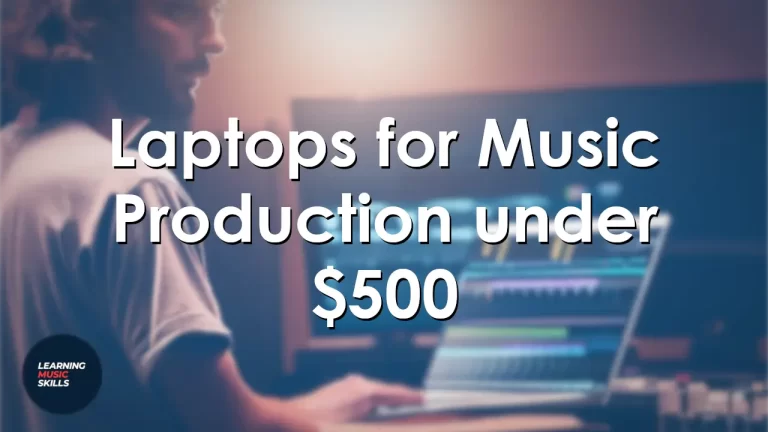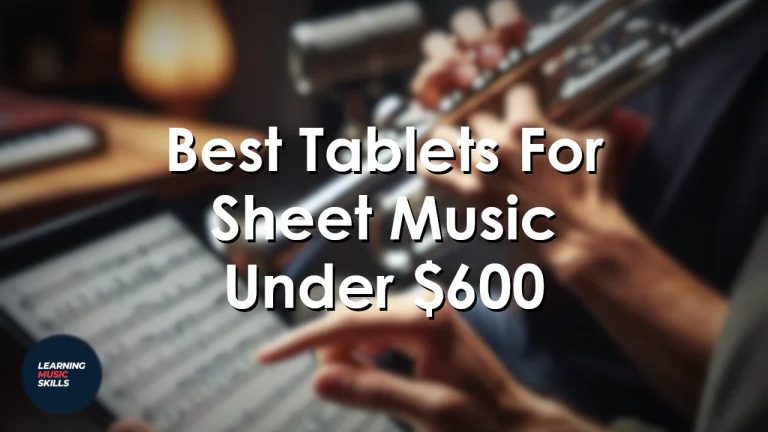Do you want to follow your passion for producing

The free tutorials and articles from Learning
Do you feel that you have something to say to the world with your
What kind of
You will save time and money, by checking out the
Top Picks
Audio-Technica AT2020 Condenser Studio Microphone Bundle
Audio-Technica AT2020 Microphone Bundle: Record your vocals professionally
To be honest you don’t need much hardware or software in the beginning. But you do need the right
USB Audio Interface
If you want to work with sound on your computer then you will need a USB audio interface. It connects your microphones, instruments, and speakers to your computer and changes the sound from analog to digital, and back. It with your computer and your audio software to record and play sound with high quality and low latency. In general, you will want to have multiple different inputs for example: XLR, 1/4Jack, Mini-Jack and optionally MIDI in and out. If your interface has MIDI ports it means that you can connect all kinds of MIDI devices that can communicate and control each other.
Focusrite Scarlett Solo 4th Gen
The audio interfaces of Focusrite don't need any introduction. I would not be surprised if more than 50% of all home studios have one. And this is for a reason. The quality and price are extremely difficult to beat.
M-Audio M-Track Solo
The M-Audio M-Track solo is by far one of the cheapest options out there. So if you want to start recording music but are not ready to make a bigger investment this audio interface will be perfect for you to test the waters.
Studio Headphones
What is the benefit of using headphones for mixing and producing
There are open-back and closed-back headphones, which ones are better? The difference between open-back and closed-back headphones is mainly the design of the ear cups. Open-back headphones are as the name suggests partially opened on the backside. The ear cups are perforated or vented and this allows some sound to escape and some ambient noise to enter. As a result, this creates a more natural and spacious soundstage. The downside however is that it also reduces the isolation of your listening. Closed-back headphones have ear cups that are sealed, which blocks most of the sound from leaking in and out. This creates a more isolated sound but it also makes it more likely to have distortion and get listening fatigue over time.
There are advantages and disadvantages to both types of headphones. Open-back headphones are better for mixing
Audio-Technica ATH-AD500X Audiophile Open-Air Headphones
Affordable, comfortable, great imaging and sound quality for the price. It is quite difficult to beat these cans in this price range.
AKG Pro Audio K702 Over-Ear, Open-Back, Reference Studio Headphones
These headphones are light as a feather and have a studio-worthy frequency response. The treble is not exaggerated.
Sennheiser Professional HD 280 PRO Over-Ear Monitoring Headphones
Durable and delivers on quality. The HD 280 are quite natural in the mids and can be used for revealing elements in your mix.
Audio-Technica ATH-M50X Professional Studio Monitor Headphones
One of the best choices for recording and listening. They are comfortable, and durable and come with 3 detachable cables.
MIDI Keyboard for Music Production
Why do you need a MIDI keyboard as a
Probably you have seen the difference already, but there are MIDI keyboards with and without pads, sliders, and knobs. Pads are small rubber buttons that you can use to trigger drum sounds, samples, or loops. They are very useful for creating beats, adding effects, or performing live. Sliders and knobs are controllers that you can use to adjust parameters such as volume, pitch, expression, filters, or modulation. They are useful for shaping your sound, adding dynamics, or automating other changes.
So in general one with pads, sliders, and knobs will offer you more options and flexibility for making
AKAI Professional MPK Mini MK3 - 25 Key
AKAI is a MIDI controller with a premium look and feel. It's the favourite of many music producers.
M-Audio Keystation Mini 32 MK3 - USB MIDI Keyboard Controller
M-Audio is probably one of the most famous MIDI keyboard and interface brands. This controller has 32 keys.
M-Audio Oxygen 49 (MKV) – 49 Key USB MIDI Keyboard Controller
If you want to play more elaborate piano/synth parts you will need 49 keys. The added pads and controls are perfect.
M-Audio Keystation 49 MK3 - Synth Action 49 Key USB MIDI Keyboard Controller
Don't need pads and want to go cheap but still have 49 keys to play your parts? Then the Keystation is for you.
Recording Microphone
There are multiple types of microphones, but the ones that are most useful to beginner musicians, producers and songwriters are:
- Dynamic microphones
- Large diaphragm condenser microphones
- Small diaphragm condenser microphones
So do you need a recording microphone? What’s the difference and what do you use them for? A dynamic microphone converts sound waves into electrical signals by using a magnet and a coil. A condenser microphone uses a thin metal plate and an electrically charged backplate to convert sound waves into electrical signals. Something that is a real characteristic of a dynamic microphone is that it is more durable and resistant to high volumes. The downside is that it is less sensitive and accurate than a condenser microphone.
A small diaphragm condenser microphone has a consistent polar pattern and a natural sound, while a large diaphragm condenser microphone has a less consistent polar pattern and a more coloured sound. In general dynamic microphones are best used for loud instrument recordings and live performances. You can use them on vocals, drums, guitars, and other loud or harsh sources. A small diaphragm condenser microphone is best suited for acoustic instruments, overheads, room mics, and other detailed or spacious sources. And lastly, a large diaphragm condenser microphone is best suited for vocals, bass drums, brass instruments, and other warm or rich sources.
Audio-Technica AT2020 Condenser Studio Microphone Bundle
Audio-Technica AT2020 Microphone Bundle: Record your vocals professionally
Shure SM57 Dynamic Instrument Microphone Bundle
You will find the SM57 in every studio and every venue. Perfect for recording electric guitar, snare drum, bass cabinets you name it.
Studio Monitors (speakers)
If you have a good set of headphones, why do you still need studio monitors to check your sound? Studio speaker monitors are used for mixing
The price range of studio monitors varies a lot. Larger and more powerful speakers can produce louder and deeper sounds. The downside is that they also require more space and a lot more acoustic treatment in your studio.
So what’s the difference between the expensive and the cheap ones? It seems stupid to say, but higher quality speakers offer more clarity, detail, and accuracy, but of course, they also ask for more precision and skill in your mixing. What affects the price of studio monitors are the type of drivers (such as woofer, tweeter, or coaxial), the type and material of the cabinet (such as ported, sealed, or curved), what kind of input and output options (such as XLR, TRS, RCA), and lastly the digital signal processing (DSP) capabilities such as room correction, EQ, or crossover.
PreSonus Eris 3.5 Gen 2 — 3.5-inch
Perfect for any novice, musician or music lover looking to upgrade their speaker setup for the first time for cheap.
Mackie CR-X Series, 5-Inch Monitors
Finding a quality pair of speakers under $200 is quite a challenge. These Mackie speakers will live up to the challenge.
Adam Audio T5V 5-Inch Studio Monitor
Whoever thought that ADAM speakers were out of their price range think again. These T5V are affordable and high quality.
Kali Audio LP-6 V2 6.5 Professional Studio Monitor
Kali Audio is a relatively new name on the scene but these speakers will leave a lasting impact. These LP-6 are for pro's.
Music Samples
Music samples and audio loops are short audio clips that you can use to create or enhance your
- You are saving time and effort: You don’t have to record or make every sound from scratch. You can use ready-made samples and loops that suit your style and genre. After importing them you can still edit, manipulate, and combine them to create your own version.
- You can expand your creativity: You can explore new sounds and styles that you may not be familiar with. Normally if you are not familiar with a style or genre it is difficult to make something good.
- You will improve your skills: If you use high-end samples like from Loopmasters then you can learn from the professionals who created the samples and loops.
It is important to know how to use
Music Software
We have left the realm of
I prefer to buy plugins when they are on discount or when you can get them as a bundle. It’s just a lot cheaper that way and also buying a bundle often makes more sense than just buying one at a time. It’s all about bang for your buck!
Practically all 3rd party plugins that I bought came from Plugin Boutique. Check their website for the best deals, instruments and bundles. Turn your home recording into a professional one.
Plugin recommendations for Studio Recording Quality
Here are some plugins that I practically use on every project.
Conclusion
You don’t need to buy all these pieces of gear at once. It’s a process that can take many years. Also, you don’t have to run out and get the most expensive stuff. You can upgrade your gear over time. You only need 4 pieces of gear to get started. So don’t get fooled by what they say on YouTube or in the store. Music making equipment for beginners does not have to cost much.
Something that helped me a lot to learn more about music production is to read books. There are a couple of them that I have read multiple times. And I catch myself grabbing for them every once in a while. So when you’re ready start reading and shorten your learning curve.






















